The ongoing conflict sees continued negotiations for peace, amid escalating casualties and humanitarian crises on the ground.
**Tragedy Strikes in Gaza: Children Among Victims of Israeli Airstrike Targeting Supplement Queue**

**Tragedy Strikes in Gaza: Children Among Victims of Israeli Airstrike Targeting Supplement Queue**
A devastating Israeli airstrike claims the lives of at least 15 Palestinians, including numerous children, as they wait for nutritional assistance in central Gaza.
The Al-Aqsa Martyrs Hospital in Gaza reported that an Israeli airstrike hit a crowd waiting for nutritional supplements in Deir al-Balah, resulting in the deaths of at least 15 Palestinians, including eight children and two women. Eyewitness accounts and graphic footage from the hospital revealed harrowing scenes of the aftermath, with many individuals wounded and in urgent need of medical care.
The Israeli military acknowledged receiving reports of the strike and stated they were in the process of verifying the details. Concurrently, reports emerged that at least 26 additional casualties occurred from strikes in various locations across Gaza on the same day.
As this tragedy unfolded, discussions aimed at negotiating a ceasefire and hostage release were ongoing between Israeli and Hamas delegations in Doha. Although officials from the US mediating the talks expressed cautious optimism, a breakthrough in negotiations remains elusive. An Israeli official indicated that an agreement might take one to two weeks to formulate. This information came during a visit to Washington by Israeli Prime Minister Benjamin Netanyahu.
Discussions focus on a potential 60-day ceasefire, which Israel hopes could pave the way for Hamas's disarmament. However, Hamas has criticized the negotiations as challenging, attributing difficulties to Israeli "intransigence." The group reaffirmed its willingness to release 10 hostages but emphasized the demand for a comprehensive agreement that would halt the ongoing military actions.
Since the escalation of violence following the Hamas-led attack on southern Israel on October 7, approximately 1,200 Israeli lives have been lost, along with reported deaths of at least 57,680 Palestinians, as per the Hamas-operated health ministry. The humanitarian situation in Gaza remains dire, marked by a massive displacement of the population, with more than 90% of homes damaged or destroyed, and critical shortages in essential supplies like food, medicine, fuel, and clean water.
The persistent conflict continues to raise urgent calls for international attention and action to address the unfolding humanitarian crisis and to seek lasting peace in the region.
The Israeli military acknowledged receiving reports of the strike and stated they were in the process of verifying the details. Concurrently, reports emerged that at least 26 additional casualties occurred from strikes in various locations across Gaza on the same day.
As this tragedy unfolded, discussions aimed at negotiating a ceasefire and hostage release were ongoing between Israeli and Hamas delegations in Doha. Although officials from the US mediating the talks expressed cautious optimism, a breakthrough in negotiations remains elusive. An Israeli official indicated that an agreement might take one to two weeks to formulate. This information came during a visit to Washington by Israeli Prime Minister Benjamin Netanyahu.
Discussions focus on a potential 60-day ceasefire, which Israel hopes could pave the way for Hamas's disarmament. However, Hamas has criticized the negotiations as challenging, attributing difficulties to Israeli "intransigence." The group reaffirmed its willingness to release 10 hostages but emphasized the demand for a comprehensive agreement that would halt the ongoing military actions.
Since the escalation of violence following the Hamas-led attack on southern Israel on October 7, approximately 1,200 Israeli lives have been lost, along with reported deaths of at least 57,680 Palestinians, as per the Hamas-operated health ministry. The humanitarian situation in Gaza remains dire, marked by a massive displacement of the population, with more than 90% of homes damaged or destroyed, and critical shortages in essential supplies like food, medicine, fuel, and clean water.
The persistent conflict continues to raise urgent calls for international attention and action to address the unfolding humanitarian crisis and to seek lasting peace in the region.




















